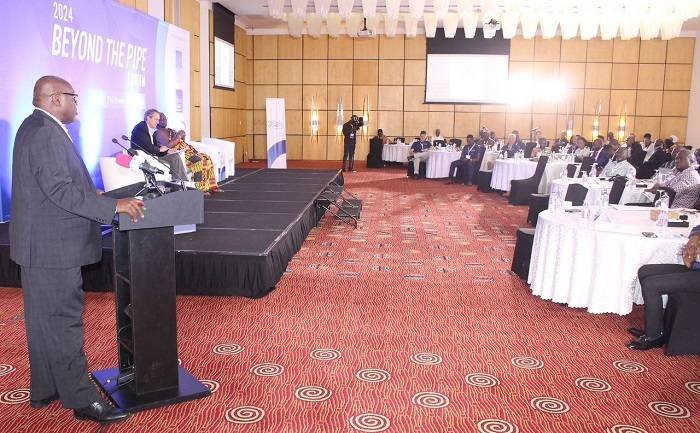
Stakeholders in the water sector have been urged to explore innovative and cutting-edge solutions to deliver improved and sustainable water services, especially in rural and peri-urban areas in the country.
This, according to the Country Director of Safe Water Network, Charles Nimako, would require the urgent need to invest funding and other resources in scaling up safe water enterprises to complement the government’s efforts in ensuring Ghanaians have equitable and clean access to water by 20230, in lone with Sustainable Development Goal (SDG) six.
Speaking at a forum on safe water in Accra yesterday, he said, in order to achieve sustainable access to water, it was critical that small water enterprises were scaled-up to support government’s efforts.
Dubbed, “Beyond The Pipe”, the 14th edition of the forum was to bring together all stakeholders toward advancing the scale-up of safe water enterprises (SWEs) to deliver safely managed water access in Ghana.
It was also to highlight and barriers for growing safe water enterprises as a critical part of a mix of water services for delivering safely managed water services for all especially in peri- urban areas and small towns in Ghana.
Within the past 15 years, Mr Nimako said, safe water enterprises had collectively invested $20million in the water sector, ensuring the delivery of safe, reliable and affordable water services to over two million Ghanaians across all 16 regions.
To enhance the sustainability and viability of water systems, he said, Safe Water Network was developing a curricula to train and certify water service professionals in the country in partnership with the National Commission for Technical and Vocational Education Training (C-TVET)
“We noted that the management of water systems have not been a part of our culture. We currently train people on the job but it has proven not to be enough. We need professionals in the area.
In this regard, we are working with the C-TVET develop a curricula for the training and certification of young people in the area of water management systems,” Mr Nimako stated.
Deputy Minister of Sanitation and Water Resources, Amidu Issahaku Chinnia, said, the government had prioritised access to safe water and was working to provide safe, reliable, and affordable water for all rural and urban water projects across the country.
That notwithstanding, he highlighted the need for private sector water service providers to collaborate with the government to enhance access to safe and potable water especially in small towns and rural communities.
Commending Safe Water Network, for years of investment in extending water services in peri- urban areas and small towns, and advocacy for improved and sustainable water services in Ghana, he said, the government recognised the challenges that impeded the provision of safe water.
He said the field experiences, overcoming the operational, technical, and financial challenges by designing cost-effective stations, and providing the training and ongoing support to ensure local operators sustainably deliver safe, reliable, and affordable water had informed government’s decisions and policies.
Mr Chinnia described as innovative Safe Water Network’s management of safe water enterprises through their digital platform, introduction of mobile money, solar power, and water ATMs.
To complement the SWE alliance’s efforts and promote coordinated investments in the water sector, the Ministry, he said, had launched the Ghana WASH Sector Development Programme (GWASHSDP) 2021-2030 which outlines priority areas and necessary investments to achieve the 2030 sector targets.
Chris Williams, Chief Executive Officer of Safe Water Network, said the organization was exploring ways to mobilise domestic capital to finance new water systems to improve access to safe water in underserving communities in Ghana.
BY CLAUDE NYARKO ADAMS







